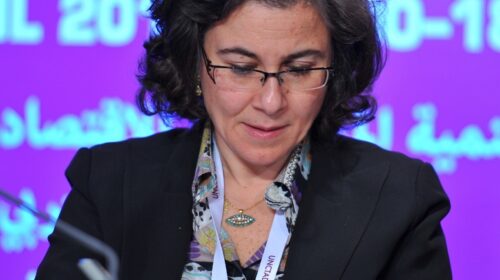UNHRC chief urges GoSL to commence national dialogue
- Acting UNHCHR Nada Al-Nashif presents report on SL
- Calls to advance human rights and combat impunity
- Notes fragile political and economic situ and troubling’ PTA use
- Proposes independent, transparent probe with int’l assistance on Easter attacks
BY Mirudhula Thambiah
United Nations (UN) Deputy High Commissioner for Human Rights (HCHR) and Acting HCHR  , presenting the report on Sri Lanka’s human rights situation at the 51st UN Human Rights Council (UNHRC) yesterday (12) in Geneva, Switzerland, encouraged the new Government to embark on a national dialogue to advance human rights and reconciliation, to carry out the deeper institutional, democratic, and security sector reforms needed in order to restore the independence of key institutions, combat impunity, prevent the recurrence of human rights violations, and tackle the economic crisis.
, presenting the report on Sri Lanka’s human rights situation at the 51st UN Human Rights Council (UNHRC) yesterday (12) in Geneva, Switzerland, encouraged the new Government to embark on a national dialogue to advance human rights and reconciliation, to carry out the deeper institutional, democratic, and security sector reforms needed in order to restore the independence of key institutions, combat impunity, prevent the recurrence of human rights violations, and tackle the economic crisis.
Al-Nashif noted that the country has been suffering an unprecedented economic crisis where inflation has reached 66.7% in the past months.
“For months now, Sri Lankans have been facing a severe shortage of fuel, electricity, food, medicines, and other essential items,” she said.
“A total of 6.3 million people are estimated to be food insecure. These realities have impaired the people’s right to food, health, education, and work. We welcome the Government’s commitments to the vulnerable, and encourage Member States and international financial institutions to ensure that Sri Lanka has the fiscal space to fulfil its core economic and social rights obligations,” she added.
She also pointed out in her report that months of countrywide protests eventually led to then President Gotabaya Rajapaksa’s resignation on 14 July, and a new President (Ranil Wickremesinghe) being elected by the Parliament on 20 July.
“Sri Lanka had navigated these changes in a largely peaceful way, and in accordance with its Constitution. But the political and economic situation remains fragile, and potential for further instability remains. Demands by Sri Lankans from all communities, youth in particular, for accountability and democratic reforms, present an important starting point for a new and common vision for the future of Sri Lanka”.
Meanwhile, Al-Nashif further said that it is essential that the Government ensures an environment for the freedoms of expression and peaceful assembly and inclusive democratic participation.
“In recent weeks, scores of members and leaders of protests, and trade unions have been arrested. Particularly troubling was the use of the Prevention of Terrorism (Temporary Provisions) Act as amended (PTA) and the arrest of three student leaders on 18 August, despite the Government’s announcement in June 2022 that it has been applying a moratorium on the use of this Act since March of this year.
“I urge the Government not to revert to this reliance on draconian security laws, but to take positive action to foster an environment for peaceful protest, critical discussion, and debate. The Government has a fresh opportunity to steer the country on the path towards justice and reconciliation and to address the legacy of the conflict,” she noted.
She welcomed President Wickremesinghe, who in his first speech to the Parliament recognised the diversity of the Sri Lankan nation and promised Constitutional reforms.
She noted that she was pleased to discuss with the Government delegation on potential areas of cooperation, including the drafting of a new counter terrorism law to replace the PTA, and in the area of transitional justice and the strengthening of institutions.
Deputy and Acting Commissioner Al-Nashif also pointed out that observations have been made by the UN Office of the HCHR (OHCHR) on the continuation of land disputes mainly related to Buddhist heritage conservation at Hindu or Islamic sites, and the expansion of military installations in the Northern and Eastern Provinces which have further jeopardised reconciliation, and has created new tensions.
“Continued reports of the surveillance and the intimidation of civil society organisations, victim groups, human rights defenders, journalists, and former cadres of the Liberation Tigers of Tamil Eelam (LTTE) by the Police, the military, and intelligence services are of concern,” she added.
She noted that despite some suspects being charged in connection with the Easter Sunday attacks of 2019, there has however been no further progress to establish the truth about the bombings. The UN OHCHR called for an independent and transparent investigation with international assistance as necessary to pursue further lines of inquiry, in particular, the role of the security establishment in a process that guarantees the full participation of victims and their representatives.
“It is the hope of this office that the Government will now seize the opportunity offered by the changed circumstances in the country to re-embark on this fundamental process, and promote national reconciliation by ensuring accountability for past human rights violations and abuses.”
Al-Nashif observed that impunity remains the central obstacle for the rule of law, reconciliation and Sri Lanka’s sustainable peace and development. This impunity that continues for those committing human rights violations has created fatal grounds for the corruption and abuse of power as well as contributing to the present economic crisis.
“The mandate granted by the UNHRC in Resolution 46/1 to continue monitoring the human rights situation and pursue accountability for crimes under international law is now more important than ever and a response to the broad based aspirations for change being pressed by Sri Lankans from all communities,” she added.